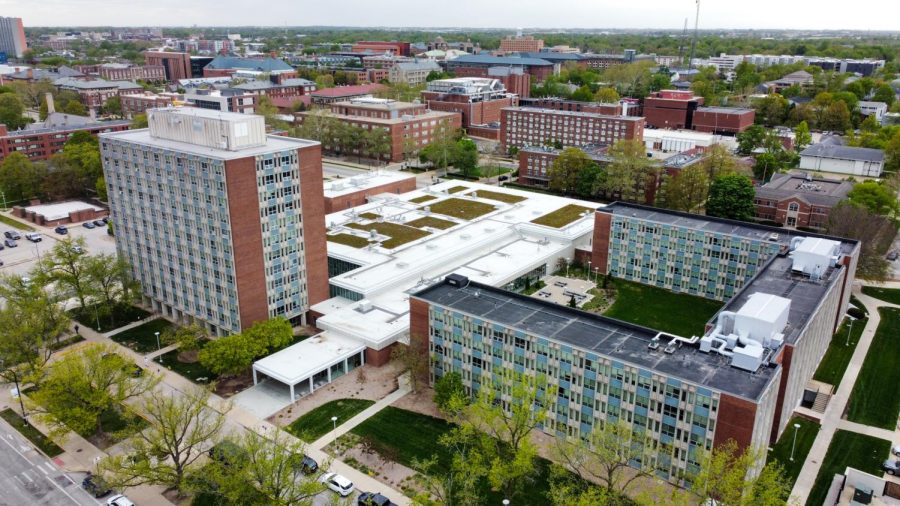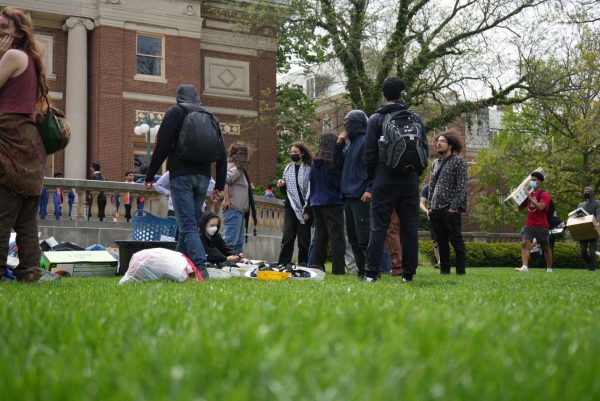Opinion | Free residence halls are a student right
An aerial view of ISR on Tuesday. Senior columnist Nathaniel Langley argues that students should not pay for housing at the University.
May 2, 2023
College is more than money. It’s the time and sweat poured into late library nights, the hungry stares down Green Street questioning what’s for dinner, the impromptu walks across campus due to crowded buses on rainy days.
But feet can’t stomp on the University’s soil without spending: Money occupies the center of collegiate life. It feeds a transactional relationship central to our time here. Without tuition payments or loans awaiting graduation, we shatter “our end” of the bargain.
We pay to stay in Champaign-Urbana. Considering each semester’s first day features an “I’m from Chicago” chorus, it can be assumed most students depend on local housing.
These leases, subsequently, recenter money in our transactional relationship with college: Paid tuition gets us in the academic door; paid leases ensure an eviction notice doesn’t kick us out the front door.
Yet, rent and tuition rise.
Get The Daily Illini in your inbox!
Although the pandemic offered brief relief, Clever Real Estate reports that from 1985 to 2020, “rent prices increased 149%, while income grew just 35%.” For college students, this consistent rent increase joins soaring tuition.
In 1985, the University’s tuition for underclassmen sat at around $1,250. Today, in-state residents can expect tuition to start at $17,000. Not an Illinois resident? Prepare for $36,000 and beyond. Notably, neither prices include the thousands more needed for housing.
As a public university, there’s a compelling obligation awaiting: Recognize housing as a right for students and remove students’ shelter from this twisted, transactional relationship.
Although private property companies own the apartment sector, the University controls its housing: residence halls. Unlike these businesses squeezing us through climbing rents, the University is designed to operate in students’ interests.
In its mission statement, the University declares that it is “charged by our state to enhance the lives of citizens in Illinois, across the nation and around the world through our leadership in learning, discovery, engagement and economic development.”
If the intention is to “enhance” lives, there is no better “enhancement” than guaranteeing student shelter. Rather than leave us bruised with already overpriced tuition, the University returns with pricey punches — striking us with an additional $11,000, if not more, for essential housing.
Especially since the University requires first-year students to live in residence halls, why charge these exorbitant prices for a necessity? Why pinch us more when we aspire for a straightforward, higher education?
Charging for residence halls defies the University’s “enhancement” mission.
Although apartments exist in the messy private market, residence halls preside under the University’s public possession. Accordingly, the University holds direct power in easing us, evident in several scholarship and grant programs.
Instituted in 2005, Illinois Promise, the University’s financial aid program for Illinois residents below the poverty line, assists with free tuition and housing for a student’s journey through college. The relatively recent Illinois Commitment, for in-state students with family incomes below $67,100, ensures free tuition yet excludes housing.
Besides these generous programs allowing numerous students to reach higher education, neither solve the cost of living crisis affecting campus. Still, they serve as models for the potential to guarantee student housing as a right.
Illinois Commitment asserts “We’ll cover tuition and fees … That’s our mission as a land-grant institution” — though the “mission” awaits the subsequent, supportive step. Just as these programs recognize free tuition as a right to certain students, free residence halls are a reasonable relief for all.
We assume there is no university without paid tuition and fees — without unquestioned payments to ever-increasing rates. Yet, Illinois Promise and Illinois Commitment prove sweeping aid continues the University’s “mission,” notably without a bankrupt conclusion.
With these latest inflated rates and successful aid programs, we’d expect offers like free residence halls to be well in place by now. However, University priorities lie obscure.
Tim Killeen, the University of Illinois System president, issues these newest prices blaming “inflationary pressures” and wishing “to maintain the excellence that students and their families expect.” Alongside the Illinois Board of Trustees, Killeen stresses a “commitment to providing financial aid that makes a real difference in students’ lives.”
Considering the system’s operating budget this year is $7.65 billion, the chance for that “real difference” couldn’t be closer. Ensuring residence halls as a right grants students extensive economic freedom elsewhere.
Real financial aid is sent to students. Instead of it cushioning statements announcing price-hike punches, genuine financial support appears in guaranteeing free residence halls.
As students, we aren’t the University’s accountants left to crunch numbers. We aren’t consultants left to figure out how free residence halls will alter local living — other than to press landlords to lower their prices in competition.
We expect the right to local housing while away from home. Sending our checks, we anticipate the affordable “excellence” Killeen and others suggest will arrive. We study today reaching for tomorrow’s success — with the hope of a consistent roof over our heads.
Atop growing tuition, common sense wanders while the University drives us to pay for its housing requirement. Our first “home away from home” can’t be a money trap set by our state’s premier public institution.
Shelter is a human necessity. For students paying every which way across Campustown, free residence halls must be a rational right to ensure prosperity.
Nathaniel is a senior in LAS.







